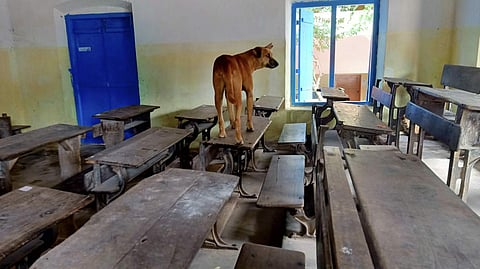
- News
- Campus
- Exam
- Podcast
- Web Stories
- Do You Know
- Path Finders - UG Programs
- Videos
- Book Review

Illegal schools are a serious problem in India, as they often provide substandard education and exploit students and their families. The Indian government has taken a number of steps to prevent illegal schools, including:
- Enacting legislation: The Right to Education Act, 2009 (RTE Act) makes it compulsory for all children between the ages of 6 and 14 to receive free and compulsory education. The RTE Act also prohibits the establishment of any new illegal schools.
- Conducting regular inspections: The government conducts regular inspections of schools to ensure that they are meeting the prescribed standards. Schools that are found to be illegal are closed down.
- Raising awareness: The government has launched a number of awareness campaigns to educate parents about the dangers of sending their children to illegal schools. These campaigns also provide information on how to identify and report illegal schools.
- Providing support to legal schools: The government provides financial and other support to legal schools to help them improve their quality of education. This helps to make legal schools more attractive to parents, which can help to reduce the demand for illegal schools.
In addition to these steps, the government is also working to address the root causes of illegal schools, such as poverty and lack of access to quality education. By addressing these issues, the government can make it more difficult for illegal schools to operate and provide parents with more options for their children's education.
Here are some specific examples of steps that have been taken to prevent illegal schools in India:
- In 2018, the Indian government launched a national campaign called Operation Talaash to identify and close down illegal schools. The campaign was successful in closing down over 10,000 illegal schools across the country.
- In 2020, the government of India launched a new online portal called the Samagra Shiksha Portal which allows parents to check the status of their child's school and report any illegal schools they may be aware of.
-In 2021, the Indian government launched a new scheme called the Pradhan Mantri Poshan Shakti Nirman Yojana (PM Poshan) which provides free and nutritious meals to all children in government and aided schools. This scheme has helped to make government schools more attractive to parents, which can help to reduce the demand for illegal schools.
The following are some of the challenges that the Indian government faces in preventing illegal schools:
- Poverty: Illegal schools often charge lower fees than legal schools, which makes them more affordable for poor families.
- Lack of access to quality education: In some rural areas, there are not enough government schools to meet the demand. This lack of access to quality education can make parents more likely to send their children to illegal schools.
- Corruption: Corruption can also play a role in the existence of illegal schools. Some corrupt officials may turn a blind eye to illegal schools in exchange for bribes.
